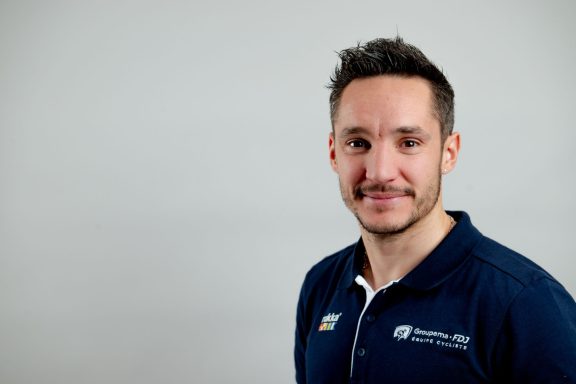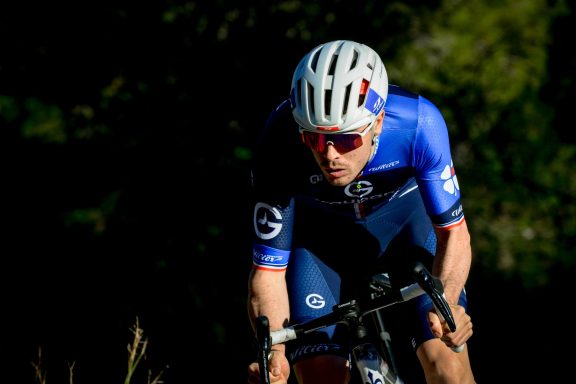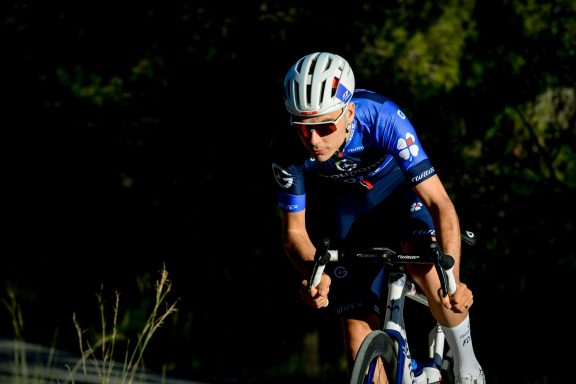Although the cycling season has been put on hold and the Groupama-FDJ cycling team provisionally deprived of practising its main activity, work doesn’t stop behind the scenes. Behind the riders and staff lies a real company, which enables the machine to keep rolling in this uncertain period. Head of the administrative and financial department, David Le Bourdiec is well placed to discuss the current issues and the consequent responses.
David, can you first tell us a little bit about yourself?
I joined the team in November 1999. There were only about 30 of us at the time and it was still just an association. Cycling did not come up by chance. I used to be a fan when I was a kid and I even raced until I was 18. I stopped because I continued my studies in preparatory class and I then went to Arts et Métiers ParisTech. As I didn’t know where to go next, I pursued a Sports Management Master, which allowed me to meet different people, who themselves led me to meet Yvon and Marc Madiot. It was one of those meetings … Obviously, the most important professionally speaking. We have developed a team together, we have been following each other since then and we will continue to do so for a while.
“Working on the team’s resilience”
For the general audience, Groupama-FDJ is firstly a team made of 28 riders, but what is the submerged part of the iceberg?
A cycling team, and a sports team in general, is a company before anything else. It must therefore work like any SME in administrative, financial terms and to give account. For my department and myself, the objective is to give the human, financial, administrative and organizational means to each department so that it can, in its area of expertise, deliver its full potential and bring added value to the team. I also make it my mission to be “the engine oil”, meaning to make sure that everyone works together in the smoothest way possible. It’s a bit of a managerial position that has become necessary over the years, as we have grown in number. We are more than a hundred now, and as the team’s level increases, we also go further in detail. We always want to improve and that’s what makes the job interesting. We never get into a routine.
Due to the Covid-19 pandemic and the season’s temporary break, is the company today at a standstill?
Let’s say that L’Echappée management company is 80% switched off since there is no cycling race. Well, the very purpose of our existence is to do cycling races and to offer visibility to our sponsors and partners. Overall, the company is therefore in low activity, although the executive members, sports directors, trainers, the Service Course staff and some collaborators remain active. At the administrative and financial level, we continue to work and finalize the structuring projects that were on hold. Human resources are still active, financial reports remain in progress. We wanted to keep a bit of a life and we work a lot on the relationships between people, departments, so that we create a collective energy and work on the team’s resilience in order to be able to come out of this situation a little stronger. We develop skills and try to emphasise the positive side of things. Human relationships are the essence of this team. Sport is about people, about connections between people, about work between people, and this is the state of mind we wanted to keep in this period so that everyone can stay focused on their future projects. By the way, we are actively preparing the upcoming seasons to live up to the trust Groupama and FDJ have given us by extending our sponsorship contract until 2024, which is unique
“We aren’t worried”
The riders haven’t been the only ones being affected by this period…
When the lockdown started, we had to reassure all of our employees and colleagues. We roughly are a hundred, but if we take families into account we are indirectly more than that. That being said, we are in contract with our partners, Groupama and FDJ, and they fully support us, they are behind us, always there, which is reassuring for everyone. We just need to pass this serenity on. However, I didn’t necessarily feel any fear among our employees. Those who join us know where they are setting foot; they know the manager, the sponsors and know that it is also kind of a big family. It certainly lessened their fears, but we still wanted to take this time to let them know that we were there, that we would still be there, and that we would resume activity as quickly as we could.
Is there a risk for the team to be deeply affected by this crisis?
We aren’t worried because we are very close to our sponsors, our main partners, and we are part of their history in a way. Still, we obviously tackled this subject fairly early with them. At no time has there been any questioning of our collaboration. On the contrary, it was straight away about support. Actually, our real concern is to know how our sponsors will go through this crisis and the coming months. We are very careful to what is going to happen and we remain in close contact to face the situation alongside them. There is no particular fear, but if they are going through important difficulties, we will logically have some as well. This proves once again that the cycling economy is fragile. 80% of our budget relies on the financial support of our sponsors. Other income is lower and far from sustainable.
How to give account to the sponsors in the current situation?
In terms of administrative and financial management, it is actually quite simple. Paradoxically, the less we do what we are supposed to do, meaning racing, the more the financial side is positive. We don’t spend anything for hotels, travels, etc. Right now, financial management is not a big deal; there is no big decision to make. The most important would rather be to plan the end of the year with the sponsors, in order to know at what financial level we will be and what impact will this crisis have on our development. We already established financial projections when the lockdown started. We speak very regularly. They also want to know where we are, how we are progressing and what decisions we are making regarding the quarantine, quarantine’s end and the upcoming protocols we intend to apply. We work with full transparency and think about what to do next, how to comprehend it with the least consequences.
“The various events have built the team’s durability”
You had to deal with the coronavirus issue quite early with the team’s riders being put in quarantine in the United Arab Emirates. Did this help the team to react more effectively afterwards?
During this episode, the main objective was not to cause psychosis among the riders and staff who were there, to reassure families about the situation and to provide them with daily basis update. The most important was to show that we were there, that we were taking care of them and that the company was looking for solutions. In this case as in others, the Comex meetings (executive committee) were very interesting and provided solutions. This very intense situation was ultimately certainly beneficial. We learned from it and we understood how important were human relationships in such times. We figured out a few solutions and means, which then served us to comprehend the quarantine in France in a good way. It also showed our co-workers that we had not abandoned our riders and employees. It was therefore a little easier to enter in this quarantine period.
Did the team’s solid base also contribute to the overall serenity?
I think so. If we’re able to aim to overcome this crisis with resilience, with the desire to emphasise the positive side, we owe it to the strong team’s structure. We have gone through difficulties and complicated times, but these are also moments when you can make the base stronger, so that the pyramid can rise as high as possible. Several years ago, the team evolved, developed and got structured into departments. It pays off today. The way we manage the team’s organization, through constant exchanges and collaboration between these different departments, allows us to move forward in the best possible way and to take the most things into consideration when a decision needs to be made. The Comex is the perfect example of this way of working. You can notice how important it is in a period like this and this new organization had become inevitable given the size of the team. Then, we always say that a company is like its boss, and Marc is very focused on people, dialogue and exchange. This is why everyone knows each other and everyone knows what the other brings. The various events have built the team’s durability.
“The rider’s performance depends on the combination of everyone’s work”
Was the arrival of Groupama alongside FDJ also a turning point for the company?
It was very important indeed, so was their immediate involvement in the team. With FDJ, we had solid foundations and we then found Groupama. They allowed us to pass a milestone in all areas. The organization evolved and we went into more detail in terms of marketing or support. We evolved towards more professionalism and we have, for instance, been able to develop our own communication department. They also allowed us, thanks to their financial input, to keep our symbolic riders and to present a more ambitious sporting project for coming years. The arrival of Groupama gave us an extra boost in order to go where we already wanted to go with FDJ. We had a vision and a path to follow and they enabled us to speed up this process.
It also contributed to intensify the emulation between all the departments?
The focal point of the team is racing and the riders. Everyone centres around that. It is obvious that the rider’s performance does not depend on just one department but on the combination of everyone’s work. Therefore, if one department encounters a problem, it may well be another that will provide solutions to it. We challenge each other, and being able to discuss with others on certain subjects also brings kind of a guarantee to the solutions that we find. Everyone plays their part. If we want to develop some projects, go further in some areas, we are able to go into it in depth. I then have to see, for my part, if I can allocate the financial means so that it fits the budget, which must be balanced at the end of the year. Choices need to be made. The idea is that we find solutions together and then assess if that seems worthwhile. The interaction between the departments is really important. This is what makes the team so strong.



No comment